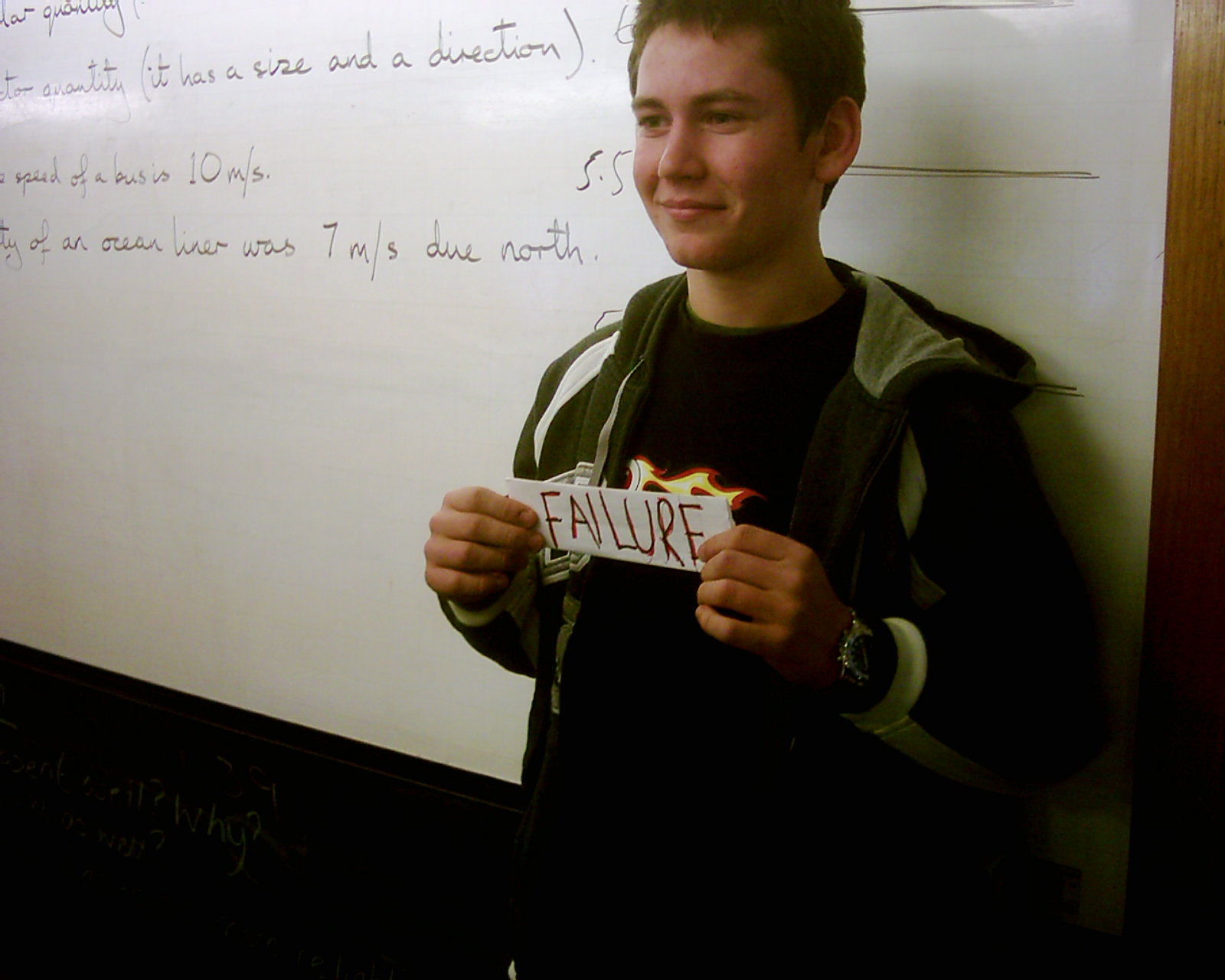
The Albanians failed the test.
It was an important one, and their parents were waiting for some news about their children’s progress. But the Albanians failed, and had to re-sit. So we revised and focused on the mistakes they’d made.
The next day, they did even worse. They managed to repeat every mistake from the previous test, and add some new ones.
That, for a while, was very frustrating: the Albanian kids missed an opportunity to learn something, but also a brilliant second chance.
Today’s post is about second chances.
Failure: the Dreaded Miracle
Remember the first “F” you ever got?
I do. I was terrified to tell my parents. This is a recurring theme: modern education, up to some point, has stigmatised mistakes. Sir Ken Robinson mentioned that in his brilliant TED talk, adding that “you’ll never be creative if you’re not prepared to be wrong.”
What you’re actually prepared to do in schools is exactly the opposite. You’re prepared to take tests until the score is well above 90%. To tackle your exams, choose your exam strategy and impress the university exam boards. You’re prepared to excel.
Which, in many cases, is fantastic. You’re learning a lot, and if you’re ambitious, you’re in for a hell of a ride.
But why does everybody treat failure like the worst thing that could happen?
Failing In Language: Brilliant Little Disasters
Think about these three situations and choose the one which happened to you today:
- forgetting a word or phrase in a conversation
- having to rely on gestures and non-verbal sounds to convey a message
- defining or describing something to somebody because they fail to understand
There’s a good chance that all these three things happened to you today. And that was in your first language!
Communicating is a difficult task, even with such wonderful tools as linguistic systems. No system is perfect: they have their unclear, complicated and failed moments. Languages – all of them – are built to expect, and withstand, failure.
That is why your body language can sometimes be so handy. That’s why words like “thingy,” “gizmo” and “sorta” exist at all.
Learning a language, then, would also involve learning about how it fails, and why it fails.
Which is good news. Because you’re going to fail, and fail often.
“Embrace the Suckiness”: How To Make Your Failure Work For You
There’s this scene in the movie “Keeping The Faith“: a rabbi (Ben Stiller) tries to console a young and stressed-out boy before his bar mitzvah. His advice – to embrace the suckiness, to “love that you suck” may sound contrary to what you were thought at school. Actually, there’s something to it.
When learning a language, moments of suckiness are crucial. They show you what you cannot do just yet. They point out areas to work on, places to explore. These moments, when utilised properly, are pure gold.
It takes a lot of determination to learn from your mistakes – focusing on the well-known things is nice and easy. You know this, and your teachers know this, which is why they’re always keen to show the progress you’re making and play to your strengths (not likely to make you write when you’ve failed your writing tests, skipping the grammar if that’s not your strong point, etc.).
That’s precisely the opposite of what you really should be doing.
As always, I’m leaving you with a quick list. It’s a ten-point plan to start learning from your failures. Start carrying it out, and watch your language improve:
- 1) Demand a break-down of your test results, every time you take them. Ask for areas / structures / skills you seem to be struggling with.
- 2) Keep a record of your language successes and failures. This doesn’t require precise measurements – your subjective remarks will be fine, e.g. “Did really well in the market today” or “still need some words to haggle more efficiently.” Don’t just note down failures, or this will quickly become too depressing.
- 3) Adjust after every failure. Take action. If you failed a test on irregular verbs, resolve to revise them more often. Struggled at a sales meeting? Read up on foreign sales reports.
- 4) Record yourself. Videos are great, but audio recordings will also do. Don’t review immediately after speaking: Find a peaceful moment and go through the recording.
- 5) When going out with your foreign friends, ask them to correct every (serious) mistake you make. Don’t turn this into a drinking game, EVER.
- 6) Speak to your tutor. Explain that you expect to be corrected often, and give them feedback on whether they’re doing this enough.
- 7) Test yourself. Whenever people get too scared to come to a test, I wonder: why do you miss this golden opportunity to learn more? After all…
- 8. What’s the worst that could happen? Imagine the worst-case scenario for your failure. A second of embarrassment at a conference? A few more hours of extra study? Is it really that bad? Once you’re comfortable with the worst that could happen –
- 9) Seek out failures. Do bold things. Engage in conversations above your level. Attempt awesome stuff with your language. You will fail, and fail often, but you will also learn a lot more than sitting in a safe place and playing to your strengths.
- 10) Fail with grace. I know students who throw a tantrum every time they fail a test. This is just another aspect of the fear of failure. Mess up, get beaten up by language – that’s fine. If you’re really serious about learning, you’ll be able to learn from your suckiness and accept it in style. Which is generally an awesome and sexy thing to do.
How have you failed, linguists? Let us know in the comments below!
Wiktor (Vic) Kostrzewski (MA, DELTA) is an author, translator, editor and project manage based in London. When he works, he thinks about languages, education, books, EdTech and teachers. When he doesn’t work, he probably trains for his next triathlon or drinks his next coffee.
BRAVE Learning (formerly known as 16 Kinds) is a lifelong learning and productivity blog. If you enjoy these posts, please check out one of my books and courses.
My recent publications, and my archive, is now all available on my new project: PUNK LEARNING. Hope to see you there!


3 replies on “I Love That I Suck: Learning Languages Through Failing”
Sound advice here, mate.
Just stumbled upon this site. It’s probably one of the best no-BS language learning blogs I’ve seen so far.
Hi Wiktor, just to say: thank you for sharing your thoughts. You provide some insightful, down-to-earth and frank advice in your articles.
Love this post, and agree 100%. The worst-case scenario is a wonderful tactic. Cheers, Brad